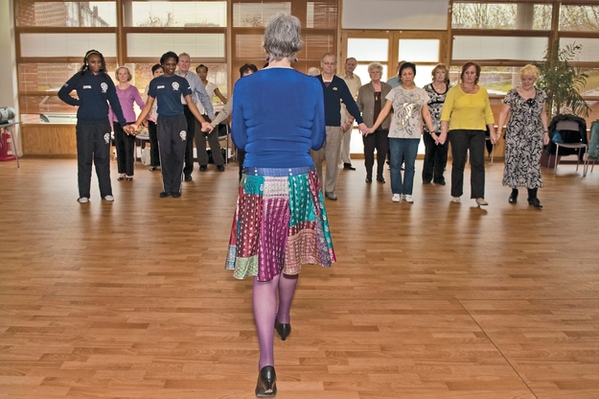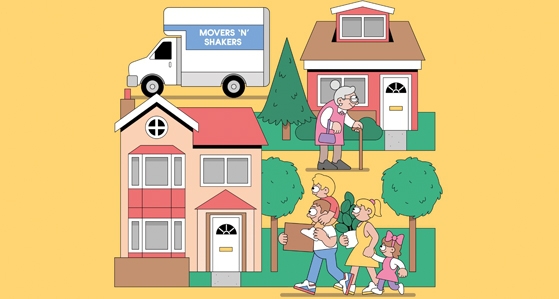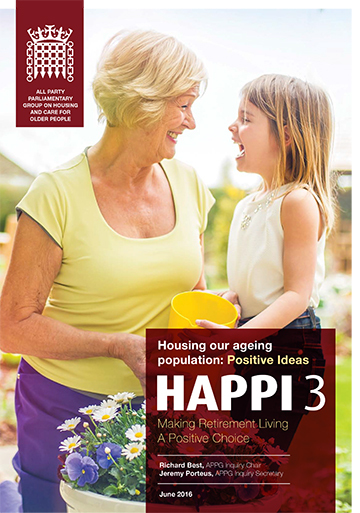You are viewing 1 of your 1 free articles
HAPPI days
A report out this week suggests older people downsizing could lead to large numbers of homes being freed up. Carl Brown finds out more

Source: Dan Woodger
Perhaps a key solution to the housing crisis has been sitting before our eyes the whole time without us quite realising it.
According to research conducted for the All-Party Parliamentary Group (APPG) on Housing and Care for Older People, there are eight million people in the UK interested, in theory, in downsizing to smaller properties. This could free up 3.5 million homes, including two million ‘family-sized’ homes of three or four bedrooms.
Despite this, only 1% of British people over the age of 60 are living in tailor-made retirement homes, and the government, through measures such as Help to Buy and Starter Homes, is instead funnelling support towards young first-time buyers.
Building high quality, fuel efficient and accessible specialist retirement housing also has obvious positives for older residents, some of whom have been left in housing that is no longer suitable for their needs.
So what needs to be done to achieve this level of downsizing at scale?
A report published on Wednesday by the APPG, which is chaired by crossbench peer Lord Richard Best, explores ways of boosting development of specialist older people’s housing and makes a number of key recommendations to ministers (see box). The report, based on findings from an expert panel, is the latest in the Housing our Ageing Population: Positive Ideas (HAPPI) series by the APPG.
Supply and demand
Simply put the problem is one of supply, but also – unlike in most housing markets today – of demand. How do you persuade people to move out of their current property, particularly if it is the former family home, with the emotional connection that can bring?
For Lord Best, design of the properties is absolutely key. “The last [house] move is never going to happen unless the design is good,” he says. The aim is to ensure that a choice to downsize is seen as a positive move to increase well-being. “Downsizing doesn’t mean moving from a three-bedroom home to a bedsit. People won’t want to move to a poky little place,” he says.
Lord Best says at the moment many people wait until they have an accident or ill health, before they are moved into a care setting, and downsizing into specialist accommodation is a way of ‘heading that off’ before it happens. Sarah Davis, policy and practice officer at the Chartered Institute of Housing (CIH), agrees. She says: “We need to encourage people to think over the long-term about what might happen.”
Lord Best believes if residents are made aware of benefits of moving to modern, specialised housing, which could include savings on maintenance, savings on fuel bills and greater accessibility, they are more likely to be open to a move. Residents may also be persuaded to move for greater companionship of communal schemes, more outdoor space and for greater space and light. Lord Best says light is an increasingly important factor, as the retina receives less light as people age.
Crucially, the report says there needs to be a range of different types of properties to ensure a diversity of needs and aspirations are met. Despite all this, Lord Best accepts that the majority of people will choose to stay put in their home, but even if just 10% of those that have said they could downsize ultimately move, the number would be a not insignificant 800,000.
One of the potential barriers of moving is also cost to residents. Much specialist housing has high service charges as residents are paying for communal services, not just a flat. Therefore there is a higher cost to the individual, or to the state if the resident is on benefits. This is made more challenging if housing benefit is capped at Local Housing Allowance rates as the government has proposed. Interestingly, Hanover Housing Association has removed “most communal facilities” from its schemes to remove costs.
The HAPPI report calls for this to be tackled by an exemption from stamp duty for older people wanting to downsize. Lord Best argues: “If you make a concession on stamp duty it sounds like the Treasury is losing money, but actually the downsizing could prompt three moves for every one older person who downsizes, so the government can bank more stamp duty.”
The CIH has also previously called for a stamp duty exemption, but perhaps more pragmatically, given the government’s commitment to austerity, has called for it to be targeted at low-equity homeowners on tax credits.
The report also says some downsizers are deterred by “the potential loss of security and value” from moving from freehold ownership to becoming a leaseholder.
Specialist private retirement housing provider McCarthy & Stone is seeking to tackle this by offering 999-year leases – as opposed to the 99 to 125-year leases more commonly used in retirement housing. The HAPPI report says McCarthy & Stone found this gave greater certainty to sellers and buyers about the ability of their next of kin to be able to retain the asset.
Work to be done
So the wider housing sector has a job to do in getting people to a position where they make a positive choice to downsize.
But what can be done to increase supply of new specialised older people’s housing?
A central thrust of the HAPPI report is that government is focused too exclusively on measures to help younger people buy homes, whereas building more homes for older downsizers can help buyers of all ages by freeing up family-sized homes.
The government hopes its £4.7bn Shared Ownership and Affordable Homes Programme (SOAHP) for 2016/21 will deliver 153,000 homes, of which just 8,000 (5%) will be specialist supported or older people’s housing. A total of 135,000 homes under the scheme will be for shared ownership.
Although shared ownership could help older downsizers moving to higher value areas, there is a debate about whether the SOAHP has enough of a focus on older people’s housing. Ms Davis says: “funding needs to be flexible to allow local areas to respond to need.”
By contrast, Frank Czarnowski, chief executive of West Kent Housing Association, says 5% of homes built by associations through SOAHP is not a bad figure, contrasting it to the 1% of the population in retirement housing overall.
Mr Czarnowski, whose organisation is building 218 specialist homes through a private finance initiative scheme, suggests it is therefore the private sector that needs to do more.
The HAPPI report reflects this. It calls for an “industry-wide awakening” among house builders and investors to “recognise the huge market for tailor-made homes for the older population”.
Peter Quinn, business development director at Lovell Partnerships, says he recognises the potentially huge market for older downsizers. But he says: “It is quite a specialist area – the sales process is much more complex, with longer chains.”
Lord Best also suggests that older movers are “rightfully fussier”, adding another layer of complexity.
Mr Czarnowski says: “If you simply want to provide the maximum number of units for the minimum amount of money you would not do this.”
One house builder, who did not wish to be named, said the funding model for specialist housing is different to building for sale, as whole blocks in communal schemes are usually built in one go, requiring a large cash outlay and different risks. This differs to the financial model used on mainstream housing, in which companies build out schemes in phases. This is arguably a key reason why building older people’s housing is currently a niche activity. Another barrier is planning and the report calls for councils to prioritise older people’s housing in Local Plans and for retirement housing to be exempt from Starter Homes requirements.
The HAPPI report also calls on housing associations to participate in “senior co-housing” schemes, under which groups of older people get together to commission the housing they want from associations. This is unlikely to make a large proportion of future build, but could play a role in empowering residents to have a say in the design of their future homes.
There are huge challenges in stimulating both demand and supply for older downsizing, but one thing’s for sure, if homes are freed up on a large scale, older people’s housing could play a significant role in helping to solve the housing crisis.
HAPPI 3 report: key recommendations
- Ministers to exempt older people from stamp duty when downsizing
- Help to Buy-style assistance for older people buying new properties
- Government to ensure policies for rent regulation and housing benefit control do not deter investment in specialist housing for older people
- The Homes and Communities Agency and Greater London Authority to boost investment in affordable retirement accommodation for rent
- Councils to ensure Local Plans give priority to older people’s housing needs
- Retirement housing should be exempt from Starter Homes obligations
- Developers recommended to offer 999 or 1,000-year leases
- Chartered Institute of Housing and National Housing Federation to be ‘advocates’ for older people’s housing
- Housing associations to assist with co-housing custom building















